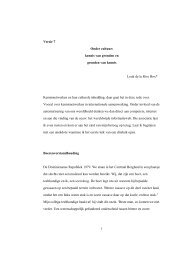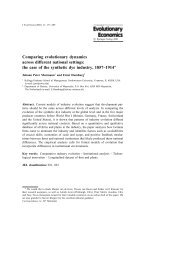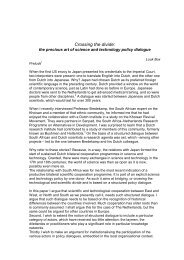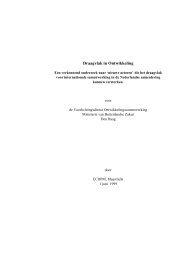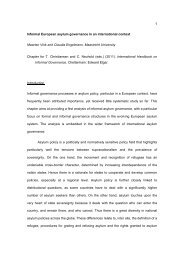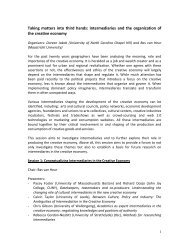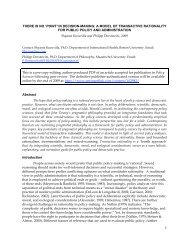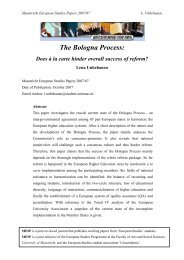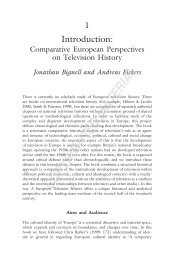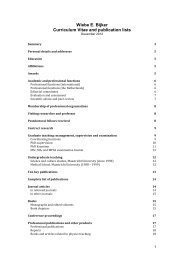Winds of Change: The Europeanization of National Foreign Policy
Winds of Change: The Europeanization of National Foreign Policy
Winds of Change: The Europeanization of National Foreign Policy
Create successful ePaper yourself
Turn your PDF publications into a flip-book with our unique Google optimized e-Paper software.
Maastricht European Studies Papers 2007/01 Bennet Strang<br />
and those which are not” 64 (i Fanés, 2001). <strong>Europeanization</strong> must further not be thought <strong>of</strong> as<br />
and expected to be an all-explanatory concept. Other influences besides it have also to be<br />
accounted for (Major/ Pomorska, 2005). Particularly in foreign policy, the EU impact is very<br />
difficult to discern (ibid.), as national diplomats are not keen to admit to have been influenced<br />
by anything else than the national side. Another difficulty lies in the task to find indicators <strong>of</strong><br />
change in foreign policy in the first place (Osswald, 2005). Thus, “…the study <strong>of</strong> the<br />
Europeanisation <strong>of</strong> a policy is probably the most difficult because <strong>of</strong> the complexity <strong>of</strong><br />
isolating an ‘EU-effect’ [emphasis in original]” 65 (i Fanés, 2001).<br />
In the quest <strong>of</strong> identifying this ‘smoking gun’, the “…‘missing link’…” (Goetz quoted<br />
in Featherstone, 2003, p. 13) between both the effect and the supposed (European) cause, the<br />
attempt is made to uncover the existence <strong>of</strong> a causal chain connecting both (i Fanés, 2001).<br />
On top <strong>of</strong> that, the question <strong>of</strong> whether <strong>Europeanization</strong> is the cause (independent variable) or<br />
effect (dependent variable) has to be posed 66 . This would lead to a chicken and egg debate,<br />
though (ibid.).<br />
Besides this problem, a second challenge is to identify the “…relevance <strong>of</strong> change…”<br />
(i Fanés, 2001), i.e. the ‘deepness’ <strong>of</strong> adaptation and the transformation(s) it triggered. This is<br />
also easier said than done, as the act <strong>of</strong> attributing relevance is inherently a subjective<br />
undertaking, which can effortlessly be challenged. Adding to the collection <strong>of</strong> challenges is<br />
the third one to account for and separate endogenous and exogenous phenomena, which act in<br />
parallel to <strong>Europeanization</strong>, from the latter. Perceiving <strong>of</strong> <strong>Europeanization</strong> as an all-explaining<br />
causal factor is, thereby, to be forestalled (ibid.). Henceforth,<br />
“[t]he foreign policies <strong>of</strong> EU Member States are subject to a number <strong>of</strong> pressures and<br />
incentives for change which act at the same time as Europeanisation, sometimes in<br />
similar directions, sometimes in completely opposite…We should avoid attributing<br />
any detected policy change to a vague idea <strong>of</strong> ‘Europeanisation” (ibid.; Major/<br />
Pomorska, 2005).<br />
64 <strong>The</strong>re is, thus, the need for “…conceptual clarity…” (Smith, 2003, p. 333), in order to avoid the<br />
stretching <strong>of</strong> the <strong>Europeanization</strong> concept (Radaelli, 2000; Wong, 2005). This very fashionable<br />
concept must eventually be clearly defined so as to prevent it from being arbitrarily used for the<br />
description <strong>of</strong> anything.<br />
65 In foreign policy, no “…legal obligation or compliance-mechanism…” (Osswald, 2005, p. 2) exists,<br />
which adds to this problem. Thus, in order to discern the European impact on national foreign policy<br />
one has to ask what makes foreign policy distinctive compared to other policies (i Fanés, 2001).<br />
Provided this factor has been isolated, Wong (2005) proposes criteria with which the degree <strong>of</strong> a<br />
state’s foreign policy <strong>Europeanization</strong> could allegedly be measured. However, the extents <strong>of</strong><br />
adaptation, projection and elite socialization are, firstly, very hard to detect and, secondly, even harder<br />
to ‘measure’.<br />
66 Notwithstanding, “[t]he boundaries between cause and effect, independent and dependent variables<br />
are blurred…” (Bulmer/ Radaelli, 2004, p. 3).<br />
18



